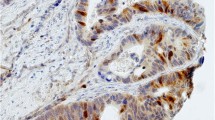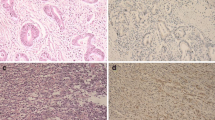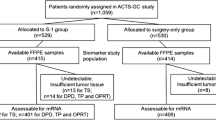Abstract
Background and aims
Many studies have been published that report an association between thymidylate synthase (TS) and response to fluoropyrimidine-based chemotherapy and the overall outcome of patients with gastrointestinal cancer. The results have given rise to the possibility that, by determination of TS levels, the physician may decide if the patient has a potential benefit from fluoropyrimidine-based treatment, similar to measurements of oestrogen receptors in breast cancer. The purpose of this review is to summarize critically the reports on TS measurement in gastrointestinal cancer, focusing on the adjuvant fluoropyrimidine treatment situation.
Methods
We reviewed more than 20 studies that reported the association of TS with the clinical outcome in patients with gastrointestinal cancer who had undergone complete resection of the primary tumour only or were receiving additional adjuvant chemotherapy.
Results
Patients with metastasized disease who expressed high TS levels display a low probability of responding to fluoropyrimidine-based treatment and have a poorer survival rate. Patients with high TS levels who undergo complete surgical resection of the primary tumour also have a poorer prognosis than those with tumours with low TS expression. In contrast to advanced disease and to surgery alone, patients with high TS levels appear to benefit, especially, from adjuvant fluoropyrimidine-based chemotherapy after complete primary tumour resection, while patients with low TS levels do not.
Conclusion
Patients with gastrointestinal cancers that express high TS levels have a poor prognosis with regard to fluoropyrimidine-based palliative chemotherapy or complete primary tumour resection. In contrast, patients with high TS levels might benefit from adjuvant fluoropyrimidine-based treatment after primary tumour resection. However, additional prospective studies are mandatory to define the precise role of TS in adjuvant therapy.

Similar content being viewed by others
References
Jemal A, Tiwari RC, Murray T, Ghafoor A, Samuels A, Ward E, Feuer EJ, Thun MJ (2004) Cancer statistics, 2004. CA Cancer J Clin 54:8–29
Midgley R, Kerr D (1999) Colorectal cancer. Lancet 353:391–399
Hanahan D, Weinberg RA (2000) The hallmarks of cancer. Cell 100:57–70
Rao S, Cunningham D (2003) Adjuvant therapy for colon cancer in the new millennium. Scand J Surg 92:57–64
Saltz LB, Minsky B (2002) Adjuvant therapy of cancers of the colon and rectum. Surg Clin North Am 82:1035–1058
Link KH, Staib L, Kornmann M, Formentini A, Schatz M, Suhr P, Messer P, Rottinger E, Beger HG (2001) Surgery, radio- and chemotherapy for multimodal treatment of rectal cancer. Swiss Surg 7:256–274
Link KH, Leder G, Formentini A, Fortnagel G, Kornmann M, Schatz M, Beger G (1999) Surgery and multimodal treatments in pancreatic cancer—a review on the basis of future multimodal treatment concepts. Gan To Kagaku Ryoho 26:10–40
Neoptolemos JP, Stocken DD, Friess H, Bassi C, Dunn JA, Hickey H, Beger H, Fernandez-Cruz L, Dervenis C, Lacaine F, Falconi M, Pederzoli P, Pap A, Spooner D, Kerr DJ, Buchler MW (2004) A randomized trial of chemoradiotherapy and chemotherapy after resection of pancreatic cancer. N Engl J Med 350:1200–1210
Lordick F, Stein HJ, Peschel C, Siewert JR (2004) Neoadjuvant therapy for oesophagogastric cancer. Br J Surg 91:540–551
Tak VM, Naunheim KS (2004) Current status of multimodality therapy for esophageal carcinoma. J Surg Res 117:22–29
Yao JC, Mansfield PF, Pisters PW, Feig BW, Janjan NA, Crane C, Ajani JA (2003) Combined-modality therapy for gastric cancer. Semin Surg Oncol 21:223–227
Stahl M (2004) Adjuvant chemoradiotherapy in gastric cancer and carcinoma of the oesophago-gastric junction. Onkologie 27:33–36
Sargent DJ, Goldberg RM, Jacobson SD, Macdonald JS, Labianca R, Haller DG, Shepherd LE, Seitz JF, Francini G (2001) A pooled analysis of adjuvant chemotherapy for resected colon cancer in elderly patients. N Engl J Med 345:1091–1097
Compton C, Fenoglio-Preiser CM, Pettigrew N, Fielding LP (2000) American Joint Committee on Cancer Prognostic Factors Consensus Conference: Colorectal Working Group. Cancer 88:1739–1757
Bast RC Jr, Ravdin P, Hayes DF, Bates S, Fritsche H Jr, Jessup JM, Kemeny N, Locker GY, Mennel RG, Somerfield MR (2000) 2000 update of recommendations for the use of tumor markers in breast and colorectal cancer: clinical practice guidelines of the American Society of Clinical Oncology. J Clin Oncol 19:1865–1878
Danenberg PV (1977) Thymidylate synthetase—a target enzyme in cancer chemotherapy. Biochim Biophys Acta 473:73–92
Van Triest B, Pinedo HM, Giaccone G, Peters GJ (2000) Downstream molecular determinants of response to 5-fluorouracil and antifolate thymidylate synthase inhibitors. Ann Oncol 11:385–391
Bertino JR, Banerjee D (2003) Is the measurement of thymidylate synthase to determine suitability for treatment with 5-fluoropyrimidines ready for prime time? Clin Cancer Res 9:1235–1239
Sobrero AF, Aschele C, Bertino JR (1997) Fluorouracil in colorectal cancer—a tale of two drugs: implications for biochemical modulation. J Clin Oncol 15:368–381
Aschele C, Lonardi S, Monfardini S (2002) Thymidylate synthase expression as a predictor of clinical response to fluoropyrimidine-based chemotherapy in advanced colorectal cancer. Cancer Treat Rev 28:27–47
Spears CP, Shahinian AH, Moran RG, Heidelberger C, Corbett TH (1982) In vivo kinetics of thymidylate synthetase inhibition of 5-fluorouracil-sensitive and -resistant murine colon adenocarcinomas. Cancer Res 42:450–456
Sanguedolce R, Brumarescu I, Dardanoni G, Grassadonia A, Vultaggio G, Rausa L (1995) Thymidylate synthase level and DNA-ploidy pattern as possible prognostic factors in human colorectal cancer: a preliminary study. Anticancer Res 15:901–906
Kornmann M, Link KH, Lenz HJ, Pillasch J, Metzger R, Butzer U, Leder GH, Weindel M, Safi F, Danenberg KD, Beger HG, Danenberg PV (1997) Thymidylate synthase is a predictor for response and resistance in hepatic artery infusion chemotherapy. Cancer Lett 118:29–35
Kornmann M, Danenberg KD, Arber N, Beger HG, Danenberg PV, Korc M (1999) Inhibition of cyclin D1 expression in human pancreatic cancer cells is associated with increased chemosensitivity and decreased expression of multiple chemoresistance genes. Cancer Res 59:3505–3511
Johnston PG, Liang CM, Henry S, Chabner BA, Allegra CJ (1991) Production and characterization of monoclonal antibodies that localize human thymidylate synthase in the cytoplasm of human cells and tissue. Cancer Res 51:6668–6676
Kornmann M, Schwabe W, Sander S, Kron M, Strater J, Polat S, Kettner E, Weiser HF, Baumann W, Schramm H, Hausler P, Ott K, Behnke D, Staib L, Beger HG, Link KH (2003) Thymidylate synthase and dihydropyrimidine dehydrogenase mRNA expression levels: predictors for survival in colorectal cancer patients receiving adjuvant 5-fluorouracil. Clin Cancer Res 9:4116–4124
Okabe H, Tsujimoto H, Fukushima M (1997) The correlation between thymidylate synthase expression and cytotoxicity of 5-fluorouracil in human cancer cell lines: study using polyclonal antibody against recombinant human thymidylate synthase. Gan To Kagaku Ryoho 24:705–712
Yamachika T, Nakanishi H, Inada K, Tsukamoto T, Kato T, Fukushima M, Inoue M, Tatematsu M (1998) A new prognostic factor for colorectal carcinoma, thymidylate synthase, and its therapeutic significance. Cancer 82:70–77
Johnston PG, Fisher ER, Rockette HE, Fisher B, Wolmark N, Drake JC, Chabner BA, Allegra CJ (1994) The role of thymidylate synthase expression in prognosis and outcome of adjuvant chemotherapy in patients with rectal cancer. J Clin Oncol 12:2640–2647
Takenoue T, Nagawa H, Matsuda K, Fujii S, Nita ME, Hatano K, Kitayama J, Tsuruo T, Muto T (2000) Relation between thymidylate synthase expression and survival in colon carcinoma, and determination of appropriate application of 5-fluorouracil by immunohistochemical method. Ann Surg Oncol 7:193–198
Sugiyama Y, Kato T, Nakazato H, Ito K, Mizuno I, Kanemitsu T, Matsumoto K, Yamaguchi A, Nakai K, Inada K, Tatematsu M (2002) Retrospective study on thymidylate synthase as a predictor of outcome and sensitivity to adjuvant chemotherapy in patients with curatively resected colorectal cancer. Anticancer Drugs 13:931–938
Popat S, Matakidou A, Houlston RS (2004) Thymidylate synthase expression and prognosis in colorectal cancer: a systematic review and meta-analysis. J Clin Oncol 22:529–536
Johnston PG, Lenz HJ, Leichman CG, Danenberg KD, Allegra CJ, Danenberg PV, Leichman L (1995) Thymidylate synthase gene and protein expression correlate and are associated with response to 5-fluorouracil in human colorectal and gastric tumors. Cancer Res 55:1407–1412
Davies MM, Johnston PG, Kaur S, Allen-Mersh TG (1999) Colorectal liver metastasis thymidylate synthase staining correlates with response to hepatic arterial floxuridine. Clin Cancer Res 5:325–328
Bathe OF, Franceschi D, Livingstone AS, Moffat FL, Tian E, Ardalan B (1999) Increased thymidylate synthase gene expression in liver metastases from colorectal carcinoma: implications for chemotherapeutic options and survival. Cancer J Sci Am 5:34–40
Lenz HJ, Leichman CG, Danenberg KD, Danenberg PV, Groshen S, Cohen H, Laine L, Crookes P, Silberman H, Baranda J, Garcia Y, Li J, Leichman L (1996) Thymidylate synthase mRNA level in adenocarcinoma of the stomach: a predictor for primary tumor response and overall survival. J Clin Oncol 14:176–182
Hillenbrand A, Formentini A, Staib L, Sander S, Salonga D, Danenberg K, Danenberg P, Kornmann M (2004) A longterm follow-up study of thymidylate synthase as a predictor for survival of patients with liver tumours receiving hepatic arterial infusion chemotherapy. Eur J Surg Oncol 30:407–413
Findlay MP, Cunningham D, Morgan G, Clinton S, Hardcastle A, Aherne GW (1997) Lack of correlation between thymidylate synthase levels in primary colorectal tumours and subsequent response to chemotherapy. Br J Cancer 75:903–909
Paradiso A, Simone G, Petroni S, Leone B, Vallejo C, Lacava J, Romero A, Machiavelli M, De Lena M, Allegra CJ, Johnston PG (2000) Thymidylate synthase and p53 primary tumour expression as predictive factors for advanced colorectal cancer patients. Br J Cancer 82:560–567
Berglund A, Edler D, Molin D, Nordlinder H, Graf W, Glimelius B (2002) Thymidylate synthase and p53 expression in primary tumor do not predict chemotherapy outcome in metastatic colorectal carcinoma. Anticancer Res 22:3653–3659
Aschele C, Debernardis D, Tunesi G, Maley F, Sobrero A (2000) Thymidylate synthase protein expression in primary colorectal cancer compared with the corresponding distant metastases and relationship with the clinical response to 5-fluorouracil. Clin Cancer Res 6:4797–4802
Marsh S, McKay JA, Curran S, Murray GI, Cassidy J, McLeod HL (2002) Primary colorectal tumour is not an accurate predictor of thymidylate synthase in lymph node metastasis. Oncol Rep 9:231–234
Gorlick R, Metzger R, Danenberg KD, Salonga D, Miles JS, Longo GS, Fu J, Banerjee D, Klimstra D, Jhanwar S, Danenberg PV, Kemeny N, Bertino JR (1998) Higher levels of thymidylate synthase gene expression are observed in pulmonary as compared with hepatic metastases of colorectal adenocarcinoma. J Clin Oncol 16:1465–1469
Yamada H, Ichikawa W, Uetake H, Shirota Y, Nihei Z, Sugihara K, Hirayama R (2001) Thymidylate synthase gene expression in primary colorectal cancer and metastatic sites. Clin Colorectal Cancer 1:169–173
Edler D, Hallstrom M, Johnston PG, Magnusson I, Ragnhammar P, Blomgren H (2000) Thymidylate synthase expression: an independent prognostic factor for local recurrence, distant metastasis, disease-free and overall survival in rectal cancer. Clin Cancer Res 6:1378–1384
Edler D, Glimelius B, Hallstrom M, Jakobsen A, Johnston PG, Magnusson I, Ragnhammar P, Blomgren H (2002) Thymidylate synthase expression in colorectal cancer: a prognostic and predictive marker of benefit from adjuvant fluorouracil-based chemotherapy. J Clin Oncol 20:1721–1728
Allegra CJ, Paik S, Colangelo LH, Parr AL, Kirsch I, Kim G, Klein P, Johnston PG, Wolmark N, Wieand HS (2003) Prognostic value of thymidylate synthase, Ki-67, and p53 in patients with Dukes’ B and C colon cancer: a National Cancer Institute–National Surgical Adjuvant Breast and Bowel Project collaborative study. J Clin Oncol 21:241–250
Tsujitani S, Konishi I, Suzuki K, Oka S, Gomyo Y, Matsumoto S, Hirooka Y, Kaibara N (2000) Expression of thymidylate synthase in relation to survival and chemosensitivity in gastric cancer patients. J Exp Clin Cancer Res 19:189–195
Hu YC, Komorowski RA, Graewin S, Hostetter G, Kallioniemi OP, Pitt HA, Ahrendt SA (2003) Thymidylate synthase expression predicts the response to 5-fluorouracil-based adjuvant therapy in pancreatic cancer. Clin Cancer Res 9:4165–4171
Allegra CJ, Parr AL, Wold LE, Mahoney MR, Sargent DJ, Johnston P, Klein P, Behan K, O’Connell MJ, Levitt R, Kugler JW, Tria Tirona M, Goldberg RM (2002) Investigation of the prognostic and predictive value of thymidylate synthase, p53, and Ki-67 in patients with locally advanced colon cancer. J Clin Oncol 20:1735–1743
Tomiak A, Vincent M, Earle CC, Johnston PG, Kocha W, Taylor M, Maroun J, Eidus L, Whiston F, Stitt L (2001) Thymidylate synthase expression in stage II and III colon cancer: a retrospective review. Am J Clin Oncol 24:597–602
Takamura M, Nio Y, Yamasawa K, Dong M, Yamaguchi K, Itakura M (2002) Implication of thymidylate synthase in the outcome of patients with invasive ductal carcinoma of the pancreas and efficacy of adjuvant chemotherapy using 5-fluorouracil or its derivatives. Anticancer Drugs 13:75–85
Edler D, Kressner U, Ragnhammar P, Johnston PG, Magnusson I, Glimelius B, Pahlman L, Lindmark G, Blomgren H (2000) Immunohistochemically detected thymidylate synthase in colorectal cancer: an independent prognostic factor of survival. Clin Cancer Res 6:488–492
Lenz HJ, Danenberg KD, Leichman CG, Florentine B, Johnston PG, Groshen S, Zhou L, Xiong YP, Danenberg PV, Leichman LP (1998) p53 and thymidylate synthase expression in untreated stage II colon cancer: associations with recurrence, survival, and site. Clin Cancer Res 4:1227–1234
Tachikawa D, Arima S, Futami K (2000) Immunohistochemical expression of thymidylate synthase as a prognostic factor and as a chemotherapeutic efficacy index in patients with colorectal carcinoma. Anticancer Res 20:4103–4107
Huang CL, Yokomise H, Kobayashi S, Fukushima M, Hitomi S, Wada H (2000) Intratumoral expression of thymidylate synthase and dihydropyrimidine dehydrogenase in non-small cell lung cancer patients treated with 5-FU-based chemotherapy. Int J Oncol 17:47–54
Nishimura R, Nagao K, Miyayama H, Matsuda M, Baba K, Matsuoka Y, Yamashita H, Fukuda M, Higuchi A, Satoh A, Mizumoto T, Hamamoto R (1999) Thymidylate synthase levels as a therapeutic and prognostic predictor in breast cancer. Anticancer Res 19:5621–5626
Choi J, Lim H, Nam DK, Kim HS, Cho DY, Yi JW, Kim HC, Cho YK, Kim MW, Joo HJ, Lee KB, Kim KB (2001) Expression of thymidylate synthase in gastric cancer patients treated with 5-fluorouracil and doxorubicin-based adjuvant chemotherapy after curative resection. Br J Cancer 84:186–192
Suda Y, Kuwashima Y, Tanaka Y, Uchida K, Akazawa S (1999) Immunohistochemical detection of thymidylate synthase in advanced gastric cancer: a prognostic indicator in patients undergoing gastrectomy followed by adjuvant chemotherapy with 5-fluoropyrimidines. Anticancer Res 19:805–810
Nanni O, Volpi A, Frassineti GL, De Paola F, Granato AM, Dubini A, Zoli W, Scarpi E, Turci D, Oliverio G, Gambi A, Amadori D (2002) Role of biological markers in the clinical outcome of colon cancer. Br J Cancer 87:868–875
Sakamoto J, Hamashima H, Suzuki H, Ito K, Mai M, Saji S, Fukushima M, Matsushita Y, Nakazato H (2003) Thymidylate synthase expression as a predictor of the prognosis of curatively resected colon carcinoma in patients registered in an adjuvant immunochemotherapy clinical trial. Oncol Rep 10:1081–1090
Cascinu S, Graziano F, Valentini M, Catalano V, Giordani P, Staccioli MP, Rossi C, Baldelli AM, Grianti C, Muretto P, Catalano G (2001) Vascular endothelial growth factor expression, S-phase fraction and thymidylate synthase quantitation in node-positive colon cancer: relationships with tumor recurrence and resistance to adjuvant chemotherapy. Ann Oncol 12:239–244
Kornmann M, Link KH, Galuba I, Ott K, Schwabe W, Hausler P, Scholz P, Strater J, Polat S, Leibl B, Kettner E, Schlichting C, Baumann W, Schramm H, Hecker U, Ridwelski K, Vogt JH, Zerbian KU, Schutze F, Kreuser ED, Behnke D, Beger HG (2002) Association of time to recurrence with thymidylate synthase and dihydropyrimidine dehydrogenase mRNA expression in stage II and III colorectal cancer. J Gastrointest Surg 6:331–337
Mayer RJ (2004) Two steps forward in the treatment of colorectal cancer. N Engl J Med 350:2406–2408
Douillard JY, Cunningham D, Roth AD, Navarro M, James RD, Karasek P, Jandik P, Iveson T, Carmichael J, Alakl M, Gruia G, Awad L, Rougier P (2000) Irinotecan combined with fluorouracil compared with fluorouracil alone as first-line treatment for metastatic colorectal cancer: a multicenter randomized trial. Lancet 355:1041–1047
Andre T, Boni C, Mounedji-Boudiaf L, Navarro M, Tabernero J, Hickish T, Topham C, Zaninelli M, Clingan P, Bridgewater J, Tabah-Fisch I, de Gramont A (2004) Oxaliplatin, fluorouracil, and leucovorin as adjuvant treatment for colon cancer. N Engl J Med 350:2343–2351
Author information
Authors and Affiliations
Corresponding author
Rights and permissions
About this article
Cite this article
Formentini, A., Henne-Bruns, D. & Kornmann, M. Thymidylate synthase expression and prognosis of patients with gastrointestinal cancers receiving adjuvant chemotherapy: a review. Langenbecks Arch Surg 389, 405–413 (2004). https://doi.org/10.1007/s00423-004-0510-y
Received:
Accepted:
Published:
Issue Date:
DOI: https://doi.org/10.1007/s00423-004-0510-y




